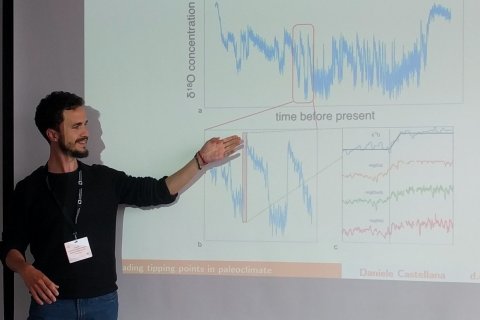Working at The Netherlands Red Cross
Former PhD student Daniele Castellana

I have always admired people who enter university with a well-defined career trajectory, a precise understanding of what they want to achieve over the next years and how to go about it. My story is slightly different.
After my studies in Theoretical Physics, I enrolled in a PhD in the Oceans and Climate group at IMAU. My research focused on investigating tipping points of the Atlantic Ocean circulation. I got very excited about the chance of applying my “theoretical” knowledge to contribute to address issues related to climate change. At that time, almost eight years ago, climate science seemed to me a great topic to work on, to combine my technical skills with my personal interest. Certainly, my sense of urgency on the climate crisis was not as strong back then as it is now. Nor was I aware of the discrepancy between the huge amount of scientific research and overwhelming consensus on one side and the inadequate efforts in policy-making on the other.
Toward the end of my PhD, these themes increasingly became dominant in my thoughts. I engaged in climate activism and public outreach, and I started to explore opportunities beyond academia, into areas related to both climate mitigation and adaptation. My definitive choice to leave university at the end of the PhD was influenced by a multitude of reasons, including the lack of stability in academic careers, the isolating nature of the work, and my desire for a more immediate and tangible impact than what a research paper can give. Nevertheless, I don’t regret having done a PhD, as it provided me with the necessary knowledge I needed for the next phases of my journey.
It is not until I met a data scientist working at 510, the data and digital unit of The Netherlands Red Cross, that I realized that people like me could find a place in the humanitarian sector. More and more, humanitarian aid is evolving into a data-driven field, and this shift needs people with a diverse range of expertise, spanning from data analysis and software development to climate science and information management. I was very happy to join the organization as a data-science volunteer, working on a skill assessment of various climate models in forecasting typhoon tracks in The Philippines.
Two years later, while working for a small environmental consultancy company, a tempting job vacancy caught my eye on LinkedIn. MapAction, a British NGO, was looking for a data scientist. This was my first real job in the humanitarian sector, that eventually led me to my current role as technical project coordinator at The Netherlands Red Cross. My tasks include overseeing and coordinating Anticipatory Action projects involving research, data science, and software development. Anticipatory Action is a set of actions taken to prevent or mitigate potential disaster impacts before a shock or before acute impacts are felt. It requires analysing climate forecast data and possibly using machine learning algorithms to link climate data with its corresponding impact information. It is a growing field in humanitarian aid, and technically skilled people are needed, both for implementing analysis and for bridging the gap between academic studies and practical applications.
What I love about my job is the diversity of the tasks, the constant relationship with people, and the impact that the organization strives to achieve.
I’d like to conclude with a reminder to myself, or possibly a piece of advice, though it may not apply to many people. I strongly believe in the importance to keep challenging my work setting, and of being open to new opportunities, even if they might seem far outside my comfort zone. Hopefully I will be able to keep this attitude in the future!
Daniele Castellana

